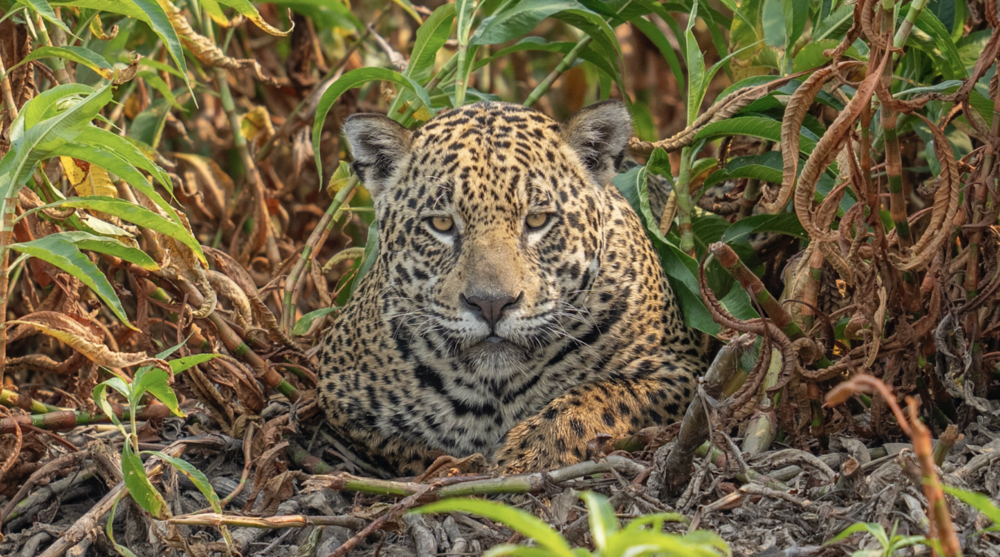
Jaguar named after Gisele Bündchen amidst catastrophic fires in the Brazilian Pantanal
In a bid to draw attention to fires ravaging the Brazilian Pantanal, a newly identified jaguar has been named "Gisele" after world-famous environmentalist and supermodel Gisele Bündchen. This symbolic act, carried out by the Jaguar ID Project, is not just a tribute. It is a rallying cry for the urgent protection and restoration of one of the world's most vital ecosystems.
In an almost fateful encounter, wildlife photographer Benjamin James from Journey with Jaguars was able to capture the image of "Gisele," a powerful female jaguar, within 24 hours of being asked to find a new one by Luciana Leite, Climate and Biodiversity Campaigner at the Environmental Justice Foundation (EJF). "It felt like the universe was aligning," Ben reflected. "In many cultures, jaguars are revered as spiritual animals. I believe this jaguar revealed herself to help us in our fight to save the Pantanal.”
However, Gisele is already at risk. She was spotted in August in the Encontro das Águas State Park, which, since last month, has had approximately one-third of its area destroyed by fires, according to estimates from the Laboratory for Environmental Satellite Applications at the Federal University of Rio de Janeiro (UFRJ/LASA). Gisele’s story exemplifies the challenge faced by wildlife in a Pantanal increasingly devastated by wildfires.
The Jaguar ID Project, which has been meticulously tracking jaguar populations in the Pantanal since 2015, aims to understand how fire and drought are threatening the survival of these majestic creatures and the broader ecosystem. The Pantanal, home to the highest density of jaguars on the planet, is facing an unprecedented crisis, they say.
"The fires plaguing the Pantanal are not just a threat to jaguars - they affect us all," says Abbie Martin, founder and director of the Jaguar ID Project. "We are witnessing the collapse of an ecosystem that supports countless species, and which we all depend on to lock up carbon out of the atmosphere. This demands immediate, global attention and action."
Despite the Pantanal’s critical importance, it has been overshadowed by other environmental crises, like deforestation in the Amazon Rainforest. However, this wetland is disappearing in front of our eyes. In 2024 alone, 2.3 million hectares have been consumed by flames, wiping out around 15% of the entire biome. Wildlife rescuers have been sharing horrifying images of dead and dying animals as they pick through the nightmare landscape looking for survivors, says EJF.
Luciana Leite, EJF Biodiversity and Climate Campaigner, underscored the gravity of the situation: "Since 2020, we've seen nearly one-third of the Pantanal destroyed by fires. We are fighting to bring this catastrophe to light, but the challenges are immense, and resources are limited. We hope that this symbolic connection between two Giseles, a jaguar and a global icon, will help draw the urgent attention needed to save this irreplaceable ecosystem."
ENDS
Notes to editors
EJF works internationally to inform policy and drive systemic, durable reforms to protect our environment and defend human rights. We investigate and expose abuses and support environmental defenders, Indigenous peoples, communities and independent journalists on the frontlines of environmental injustice. Our campaigns aim to secure peaceful, equitable and sustainable futures.
Our investigators, researchers, filmmakers and campaigners work with grassroots partners and environmental defenders across the globe. Our work to secure environmental justice aims to protect our global climate, ocean, forests and wildlife and defend basic human rights. For more information, please contact media@ejfoundation.org.
The Jaguar ID Project leverages citizen-science and researcher observations to construct a comprehensive database focusing on the distinctive identities of individual jaguars inhabiting the Northern Pantanal region within the Meeting of the Waters state park.
With these jaguars adapting to human presence, Jaguar ID Project have had the opportunity to observe and document various individuals' behaviours. Since the early 2000s, the project has been cataloguing jaguars in this area, utilising their spot patterns in a similar way to how we humans use fingerprinting techniques. For more information, please contact info@jaguaridproject.com.

